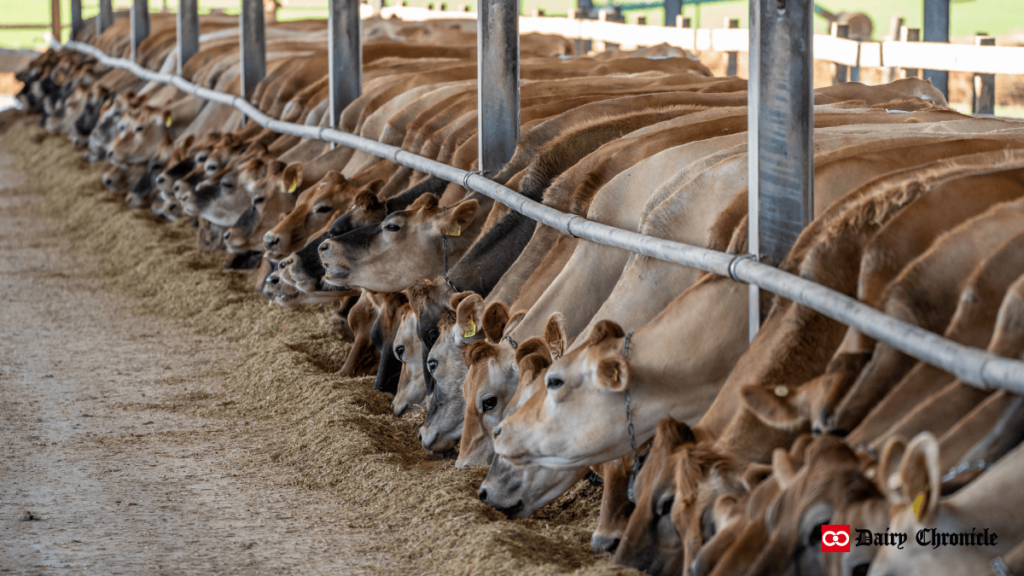The introduction of Bovaer, a feed additive designed to reduce methane emissions in dairy cows, has sparked debate due to its rapid FDA approval and the push for fast-tracking similar products. While supporters argue for its potential environmental benefits and economic impact, critics question its effectiveness and warn against relying on such additives over broader food system changes.
The U.S. dairy industry is witnessing a significant development with the introduction of Bovaer, a feed additive designed to reduce methane emissions in dairy cows. However, its rapid approval by the U.S. Food and Drug Administration (FDA) and the push for legislative changes to streamline the approval process have sparked considerable debate. Critics question the efficacy of such additives and the potential implications of fast-tracking their approval.
Bovaer’s Environmental Claims and Rapid Approval
Bovaer, also known as 3-nitrooxypropanol (3-NOP), is an innovative feed additive that aims to reduce methane emissions in dairy cows by inhibiting an enzyme responsible for methane production in their intestines. According to its manufacturer, Elanco, Bovaer can cut methane emissions by up to 30% in dairy cattle, a significant claim given the environmental impact of methane, a potent greenhouse gas.
What has raised eyebrows is the speed of Bovaer’s approval. Typically, new animal drugs undergo a rigorous FDA review process that can take nearly a decade. However, Bovaer was approved in less than a year, a timeframe much shorter than the industry norm. This expedited approval has led to concerns about the adequacy of the review process, particularly since the FDA did not conduct independent tests to verify Elanco’s claims.
Legislative Push for Fast-Track Feed Additive Approval
The fast-tracking of Bovaer’s approval is not an isolated event. It is part of a broader legislative push to make it easier for feed additives to enter the market. The proposed Innovative FEED Act seeks to reclassify feed additives like Bovaer as “zootechnical animal food substances” rather than drugs. This reclassification would significantly reduce the FDA’s regulatory oversight, allowing for quicker commercialization of these products.
The bill has garnered support from major livestock industry groups, including the American Feed Industry Association, and is backed by a bipartisan group of lawmakers. Proponents argue that the current lengthy and expensive review process hinders innovation in the livestock industry and that faster approval is necessary to maintain the U.S.’s competitive edge in the global market.
The Role of Carbon Markets and Bovaer’s Economic Impact
Elanco’s strategy for marketing Bovaer is closely tied to the emerging carbon credit market. The company has launched a carbon credit program called Athian, which allows farmers who use Bovaer to claim carbon credits for reducing methane emissions. Unlike traditional carbon offsets, which involve external projects, Athian focuses on “carbon insets,” reductions made within a company’s own supply chain.
While this model is seen as a more direct approach to reducing emissions, it has also faced criticism. Environmental advocates argue that such measures should be industry-wide standards rather than being incentivized through carbon credits. They caution that relying on additives like Bovaer may allow the livestock industry to avoid making more substantial systemic changes needed to address climate change.
Criticism of Feed Additive Efficacy and Calls for Broader Food System Changes
Despite the promising claims, there is skepticism about the overall effectiveness of Bovaer and similar feed additives. Critics point out that while some studies show significant reductions in methane emissions, results vary widely depending on numerous factors. This inconsistency has led to concerns that the benefits of Bovaer may be overstated.
Moreover, a survey conducted by Harvard University, which involved 200 experts, suggested that reducing meat and dairy consumption and transitioning to more plant-based diets would be more effective in combating climate change than relying on feed additives alone. These experts argue for a broader shift in the food system to address the environmental impact of livestock production more effectively.
The introduction of Bovaer and the proposed legislative changes to fast-track feed additive approvals have ignited a complex debate about the future of agricultural sustainability and regulatory oversight. While Bovaer offers a potential tool for reducing methane emissions in dairy cows, the controversy surrounding its approval process and effectiveness raises important questions about the livestock industry’s approach to addressing climate change. As discussions continue, finding the right balance between innovation, regulation, and genuine environmental impact will be crucial in shaping the future of sustainable agriculture.
